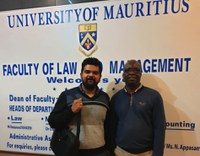Prof Durojaye delivered guest lecture on Non-communicable diseases to Law students at the University of Mauritius
In his lecture, he explained that non-communicable diseases (NCDs) or diseases or lifestyle, are the leading causes of deaths in many parts of the world, especially developing countries. According to the World Health Organisation, about 41 million people die (about 71% of all deaths) each year as result of NCDs. He identified the four main NCDs responsible for most of these deaths to include cardiovascular diseases (17 million), cancers (9 million), chronic respiratory diseases (3.8) and diabetes (1.6 million). He observed that the international community in SDG 3.4 has committed to reduce by one-third premature mortality from NCDs through prevention and treatment.
He noted that adopting a rights-based approach to NCDs enables us to frame NCDs-related deaths as a matter of social injustice that requires the urgent attention of African governments. It also helps in framing the lack of access to essential medicines to treat NCDs as a threat to the enjoyment of the rights to health care services, life and dignity. According to him, a rights-based framework imposes obligations on African governments to take appropriate measures to prevent and treat NCDs in order to save lives. He recommended that African governments must adopt progressive laws and policies to address NCDs, commit resources to the health sector, show political will and ensure the accessibility of essential medicines to treat NCDs.
In his closing remarks, the Head of the Law Department, Mr Amar Mahadew noted that NCDs pose great threats to social and economic well-being of people in Africa, yet little legal research has been done on this in Africa. He urged the students as future lawyers and judges to consider taking serious in interest in this issue with a view to addressing deaths caused by NCDs.
The visit to University of Mauritius is part of on-going research on ‘Adopting a Rights--Based Approach to Non-communicable Diseases in Africa’ currently funded by the Office of the Deputy Vice-Chancellor Research, University of the Western Cape.

